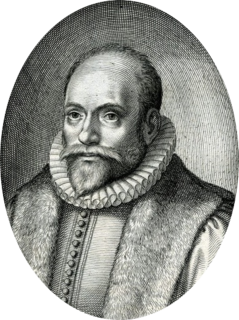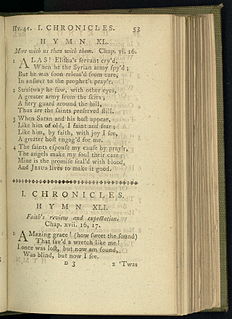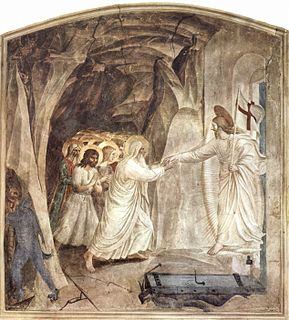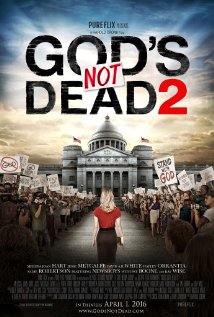
Arminianism is a branch of Protestantism based on the theological ideas of the Dutch Reformed theologian Jacobus Arminius (1560–1609) and his historic supporters known as Remonstrants. His teachings held to the five solae of the Reformation, but they were distinct from particular teachings of Martin Luther, Huldrych Zwingli, John Calvin, and other Protestant Reformers. Jacobus Arminius was a student of Theodore Beza at the Theological University of Geneva. Arminianism is known to some as a soteriological diversification of Calvinism; to others, Arminianism is a reclamation of early Church theological consensus.

"Amazing Grace" is a Christian hymn published in 1779, with words written in 1772 by the English poet and Anglican clergyman John Newton (1725–1807).

Calvinism is a major branch of Protestantism that follows the theological tradition and forms of Christian practice set down by John Calvin and other Reformation-era theologians.

Predestination, in theology, is the doctrine that all events have been willed by God, usually with reference to the eventual fate of the individual soul. Explanations of predestination often seek to address the "paradox of free will", whereby God's omniscience seems incompatible with human free will. In this usage, predestination can be regarded as a form of religious determinism; and usually predeterminism.

Sola fide, also known as justification by faith alone, is a Christian theological doctrine commonly held to distinguish many Protestant churches from the Catholic Church, the Eastern Orthodox Churches and the Oriental Orthodox Churches.

Total depravity is a Christian theological doctrine derived from the concept of original sin. It is the teaching that, as a consequence of the Fall of Man, every person born into the world is enslaved to the service of sin as a result of their fallen nature and, apart from the efficacious or prevenient grace of God, is utterly unable to choose to follow God, refrain from evil, or accept the gift of salvation as it is offered.

In Western Christian theology, grace is "the love and mercy given to us by God because God desires us to have it, not necessarily because of anything we have done to earn it". It is not a created substance of any kind. "Grace is favour, the free and undeserved help that God gives us to respond to his call to become children of God, adoptive sons, partakers of the divine nature and of eternal life." It is understood by Christians to be a spontaneous gift from God to people "generous, free and totally unexpected and undeserved" – that takes the form of divine favor, love, clemency, and a share in the divine life of God.

Bruce Almighty is a 2003 American fantasy comedy film directed by Tom Shadyac and written by Steve Koren, Mark O'Keefe and Steve Oedekerk. The film stars Jim Carrey as Bruce Nolan, a down-on-his-luck TV reporter who complains to God that he is not doing his job correctly, and is offered the chance to try being God himself for one week.

In Christian theology, justification is God's righteous act of removing the guilt and penalty of sin while, at the same time, declaring the ungodly to be righteous through faith in Christ's atoning sacrifice.
In Christian theology, synergism is the position of those who hold that salvation involves some form of cooperation between divine grace and human freedom. It stands opposed to monergism, a doctrine most commonly associated with the Lutheran, as well as Reformed Protestant traditions, whose soteriologies have been strongly influenced by the North African bishop and Latin Church Father Augustine of Hippo (354–430). Lutheranism, however, confesses a monergist salvation and synergist damnation. Synergism is upheld by the Orthodox and Roman Catholic Churches, and by the Methodist Churches. It is an integral part of Arminian theology.
Sanctification is the act or process of acquiring sanctity, of being made or becoming holy.

The Great Seal of the Realm or Great Seal of the United Kingdom of Great Britain and Northern Ireland is a seal that is used to symbolise the Sovereign's approval of important state documents.

Covenant theology is a conceptual overview and interpretive framework for understanding the overall structure of the Bible. It uses the theological concept of a covenant as an organizing principle for Christian theology. The standard form of covenant theology views the history of God's dealings with mankind, from Creation to Fall to Redemption to Consummation, under the framework of three overarching theological covenants: those of redemption, of works, and of grace.

Irresistible grace is a doctrine in Christian theology particularly associated with Calvinism, which teaches that the saving grace of God is effectually applied to those whom He has determined to save and, in God's timing, overcomes their resistance to obeying the call of the gospel, bringing them to faith in Christ. It is to be distinguished from prevenient grace, particularly associated with Arminianism, which teaches that the offer of salvation through grace does not act irresistibly in a purely cause-effect, deterministic method, but rather in an influence-and-response fashion that can be both freely accepted and freely denied.
The means of grace in Christian theology are those things through which God gives grace. Just what this grace entails is interpreted in various ways: generally speaking, some see it as God blessing humankind so as to sustain and empower the Christian life; others see it as forgiveness, life, and salvation.
Prevenient grace is a Christian theological concept rooted in Arminian theology, though it appeared earlier in Catholic theology. It is divine grace that precedes human decision. In other words, God will start showing love to that individual at a certain point in his lifetime.
Regeneration, while sometimes perceived to be a step in the Ordo salutis, is generally understood in Christian theology to be the objective work of God in a believer's life. Spiritually, it means that God brings Christians to new life or "born again" from a previous state of separation from God and subjection to the decay of death. Thus, in Lutheran and Roman Catholic theology, it generally means that which takes place during baptism. In Calvinism and Arminian theology, baptism is recognized as an outward sign of an inward reality which is to follow regeneration as a sign of obedience to the New Testament.
Divine grace is a theological term present in many religions. It has been defined as the divine influence which operates in humans to regenerate and sanctify, to inspire virtuous impulses, and to impart strength to endure trial and resist temptation; and as an individual virtue or excellence of divine origin.

A sacrament is a Christian rite recognized as of particular importance and significance. There are various views on the existence and meaning of such rites. Many Christians consider the sacraments to be a visible symbol of the reality of God, as well as a means by which God enacts his grace. Many denominations, including the Catholic, Anglican, Lutheran, Methodist, and Reformed, hold to the definition of sacrament formulated by Augustine of Hippo: an outward sign of an inward grace that has been instituted by Jesus Christ. Sacraments signify God's grace in a way that is outwardly observable to the participant.

God's Not Dead 2 is a 2016 American Christian drama film, directed by Harold Cronk, and starring Melissa Joan Hart, Jesse Metcalfe, David A. R. White, Hayley Orrantia and Sadie Robertson. It is a sequel to the 2014 film God's Not Dead, and focuses on a high school teacher facing a court case that could end her career, after having answered a student's question about Jesus.














